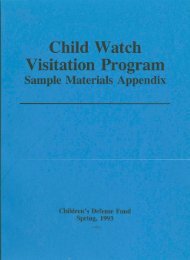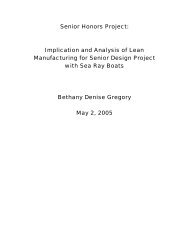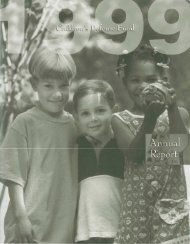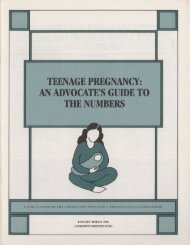children out of school in america - University of Tennessee Digital ...
children out of school in america - University of Tennessee Digital ...
children out of school in america - University of Tennessee Digital ...
You also want an ePaper? Increase the reach of your titles
YUMPU automatically turns print PDFs into web optimized ePapers that Google loves.
dren were suspended. The next highest rates <strong>of</strong> suspension<br />
occurred among <strong>children</strong> <strong>of</strong> Spanish orig<strong>in</strong>:<br />
4.5 percent <strong>of</strong> Puerto Rican <strong>children</strong> and 3.9 percent<br />
<strong>of</strong> Mexican-American <strong>children</strong>.<br />
At the secondary <strong>school</strong> level, black students<br />
<strong>in</strong> our survey were suspended more than three<br />
times as <strong>of</strong>ten as white students - 12.8 percent compared<br />
with 4.1 percent. We also found 9.4 percent<br />
<strong>of</strong> the Puerto Rican students, 7.1 percent <strong>of</strong> the<br />
Mexican-American students and 1.2 percent <strong>of</strong> the<br />
Portuguese students suspended.<br />
OCR data for our survey districts show eight <strong>of</strong><br />
the 15 districts reported suspend<strong>in</strong>g 5 percent or<br />
more <strong>of</strong> their black students. In two <strong>of</strong> the eight<br />
- Denver and Richland County No. 1 - approximately<br />
15 percent <strong>of</strong> the black students were suspended.<br />
Only five districts reported suspend<strong>in</strong>g 5<br />
percent or more <strong>of</strong> their white students.<br />
Expu.lsions and suspensions are frequently a unilateral<br />
process with little or no chance for <strong>children</strong><br />
or their parents to be heard. And they are <strong>of</strong>ten<br />
imposed so arbitrarily that they lack all semblance<br />
<strong>of</strong> fairness. For example:<br />
-In Macon, Georgia, a 16-year-old black youngster<br />
was expelled for the rest <strong>of</strong> the <strong>school</strong> term<br />
(three months) because he could not pay $5.00<br />
to replace a ruler he had broken accidentally <strong>in</strong><br />
shop class.<br />
-In New Bedford, Massachusetts, a l7-year-old<br />
white boy was suspended for two days when he<br />
left the <strong>school</strong> grounds to help an old man<br />
change a fiat tire. When his mother called the<br />
<strong>school</strong> to <strong>in</strong>quire ab<strong>out</strong> the <strong>in</strong>cident, she was<br />
told her son had done a good deed but the<br />
rule was that he had to be suspended for leav<strong>in</strong>g<br />
<strong>school</strong> grounds and it could not be broken.<br />
Whether <strong>children</strong> are "allowed" to be <strong>out</strong>, "exempted"<br />
<strong>out</strong>, "counseled" <strong>out</strong>, "pushed" <strong>out</strong>, not<br />
permitted to enroll, expelled, suspended or "encouraged"<br />
to drop <strong>out</strong>, the result is the same: exclusion<br />
from <strong>school</strong>. What does this do to <strong>children</strong> and to<br />
society?<br />
For <strong>children</strong>, it means be<strong>in</strong>g <strong>out</strong>casts. Schools <strong>in</strong><br />
effect say to a child ". . . that he is unfit to be where<br />
society has determ<strong>in</strong>ed all acceptable citizens <strong>of</strong> his<br />
age should be."9 What do <strong>children</strong> th<strong>in</strong>k <strong>of</strong> themselves<br />
<strong>in</strong> that position? What do they believe they<br />
6<br />
can become? Where do they get the confidence and<br />
skills to succeed <strong>in</strong> society? All they get is a label<br />
- dummy, truant, drop<strong>out</strong>, retarded - and the opportunity<br />
to miss grow<strong>in</strong>g up as more privileged<br />
<strong>children</strong> do <strong>in</strong> America. By treat<strong>in</strong>g them so, <strong>school</strong>s<br />
make it more likely that these <strong>children</strong> will grow up<br />
to be illiterate, unemployed, del<strong>in</strong>quent, rebellious,<br />
and dependent. And for society, it means that<br />
enormous amounts <strong>of</strong> services will be <strong>in</strong>evitable to<br />
remediate <strong>children</strong>'s needs ignored today.<br />
That certa<strong>in</strong> groups <strong>of</strong> <strong>children</strong> have been s<strong>in</strong>gled<br />
<strong>out</strong> for special deprivation <strong>of</strong> education should not<br />
encourage the complacence <strong>of</strong> those <strong>out</strong>side these<br />
groups. There are far too many <strong>children</strong> <strong>out</strong> <strong>of</strong><br />
<strong>school</strong> to isolate or to forget. It is important to care<br />
ab<strong>out</strong> the <strong>children</strong> who are excluded from <strong>school</strong><br />
not only for themselves but also because the attitudes<br />
and practices that exclude them affect all <strong>children</strong><br />
who attend public <strong>school</strong>s <strong>in</strong> this country. Most <strong>of</strong><br />
us th<strong>in</strong>k that exclusion because <strong>of</strong> discipl<strong>in</strong>e, mislabel<strong>in</strong>g,<br />
pregnancy, or truancy, happens to "other"<br />
<strong>children</strong>, never to "ours." We try to overlook the<br />
problem, s<strong>in</strong>ce we tell ourselves it does not affect us.<br />
But it does. Schools that carelessly mislabel poor<br />
<strong>children</strong> as retarded also carelessly mislabel rniddleclass<br />
<strong>children</strong> as dyslexic or hyperk<strong>in</strong>etic. Systems<br />
that have <strong>in</strong>adequate or segregated special education<br />
classes stigmatize and fail to help all <strong>children</strong> with<br />
learn<strong>in</strong>g disabilities, regardless <strong>of</strong> their social class.<br />
Teachers who cannot tolerate diversity may be as<br />
unable to enrich the program for especially bright<br />
<strong>children</strong> as they are unable to cope with especially<br />
slow ones. Even if "your" child is not one who is<br />
excluded, he sees the processes at work and learns<br />
the values and expectations that are communicated.<br />
Schools that punish unfairly teach both the victim<br />
and the observer <strong>in</strong>justice.<br />
We are aware that some people have doubts that<br />
our <strong>school</strong>s can effectively foster equality and promote<br />
upward mobility. This report does not address<br />
these complex issues. It rests on the more fundamental<br />
and <strong>in</strong>disputable premise that total denial <strong>of</strong><br />
<strong>school</strong><strong>in</strong>g is an almost certa<strong>in</strong> guarantee <strong>of</strong> failure<br />
<strong>in</strong> American society. Even the most skeptical <strong>of</strong><br />
9 William Buss, "Procedural Due Process for School Discipl<strong>in</strong>e:<br />
Prob<strong>in</strong>g the Constitutional Outl<strong>in</strong>e," 119 <strong>University</strong><br />
<strong>of</strong> Pennsylvania Law Review (February 1971), p. 577.














